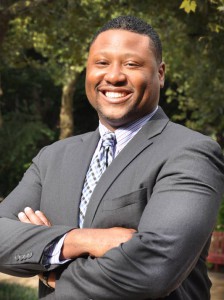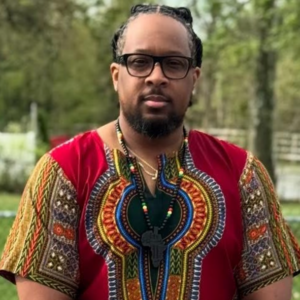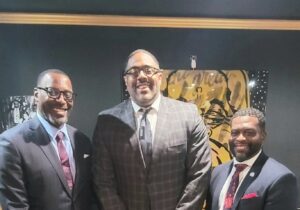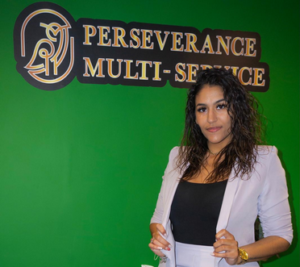Oscar Holmes IV Means Business at Rutgers-Camden

By Clyde Hughes | AC JosepH Media
CAMDEN – As an award-winning business professor at Rutgers University-Camden, Dr. Oscar Holmes IV clearly understands why people make the “business case for diversity” – he just doesn’t like it.
The business benefits of a diverse workforce is more obvious than ever, particularly when businesses have to cater to a growing diverse customer base and deal with suppliers and business leaders that are increasingly more diverse.
But Holmes said diversity should be valued because it is simply just the right thing to do.
“Although I understand why people like to make this case, I fundamentally disagree with this premise and think people should stop pushing the business case for diversity,” said Holmes, director of access and outreach for business education at Rutgers-Camden and associate professor of management.
“Diversity should be valued simply because people are people, hence, people are valuable. Moreover, diversity should be valued because it is all of our jobs to create a more equitable society. This requires that governments and organizations be more proactive in adopting and implementing programs to realize this equity. It won’t just happen on its own. We need to be more intentional in terms of correcting past and present injustices in our society,” he added.
Holmes has seen that diversity in action, teaching a diverse student body at Rutgers-Camden that comes in with more working experience under their belts today than ever. Â
Making a Meaningful Impact
As an African-American and gay professor, he has taken great pride in making sure his students reach into the local community to let others feel the impact of their education. Students from his organizational behavior classes partner with primarily local nonprofits to help the organizations raise money and awareness.
The Philly Voice said in a 2017 story that his students raised around $30,000 and have collected clothes and toiletries for donation. The work gives his students critical hands-on experiences before entering the workforce.
“There is no shortage of people here who are willing to make important connections and collaborate in order to make a positive difference,” Holmes said. “Therefore, I hope the impact that I have while I am here is to motivate, inspire, and assist others in achieving their dreams through conducting high quality and important research, teaching them the most up-to-date and relevant management theories, strategies, cases, and skills, and lending my expertise to serve the university and broader New Jersey community through the various philanthropic work that I do.”
At 37, Holmes has already won numerous awards for his work as a professor and in the community. Those awards highlight his research, such as the New Jersey Policy Research Organization Foundation Bright Idea Award for Academy of Management Annals Publication he won last year. He also earned the Mid-Atlantic Association of College of Business Administration Innovation in Teaching Award in 2018, along with the Rutgers Chancellor’s Award for Teaching Excellence in 2016.
“All the awards I get are special to me as I never take any of them for granted,” Holmes said. “If I could choose only one, I would say that I am most proud of the Poets & Quants 40 Under 40 Best Business School Professors Award (in 2018). This is a very prestigious list and the competition to get on the list is quite remarkable.
“Moreover, many of the scholars I admire and look up to have made the list so it was quite an honor to make it myself. Finally, I know a lot of weight is placed on the nomination letters that my students and colleagues have to submit on my behalf so it was humbling to read some highlights from the letters they wrote,” he continued.
Embracing Camden and South Jersey
Holmes, a Virginia native, said he was attracted to working at Rutgers-Camden early on after earning his doctorate from University of Alabama.
“I remember taking trips to New Jersey to visit some of my relatives and have always been fond of those trips, Holmes said. “I really like the northeast and its proximity to so many major cities and the culture and opportunity this proximity offers. When I was on the job market, I targeted research, one, schools with great reputations in large metropolitan areas, so Rutgers-Camden ranked first on my list (I liked that faculty didn’t have to travel between two campuses at Rutgers-Camden like they do at Rutgers Business School (Newark-New Brunswick).
“I was beyond ecstatic that they actually had a job opening when I was on the market and that I ended up getting the job. Although I have had opportunities to leave, the great collegial culture and administrative support I receive at Rutgers-Camden is what motivates me to stay here,” he said.
Holmes counts family – particularly his husband Kris White and brother Olando Holmes Sr. – as personal inspirations.
“I have so many personal inspirations that I do not want to start naming people as I would run out of space,” Holmes joked. “But the two people who I will name as personal inspirations are my husband, Kris White, and brother, Olando Holmes, Sr. I couldn’t live the great life I live now if it wasn’t for my husband, Kris, and my brother, Olando, provided me with innumerable amounts of support as I was working on my Ph.D.
“I’m also blessed that I have had so many teachers, mentors, and professors who believed in me and who have supported me. I have also had the privilege to be a part of fraternal and religious communities who have nurtured my development. Of course, my entire family is an inspiration to me and I am grateful to them,” Holmes continued.
Holmes, who came out at 21, said that he has been blessed not to encounter any major negative experiences while living in Virginia and New Jersey. He said even living in Alabama at 28 pursing his doctorate, he was comfortable with his sexuality.
“I will say, however, that when I was at the University of Alabama, I was immersed in the college culture there so all of my connections there were generally through the university,” Holmes said. “I recognize that growing up in Alabama without a college connection can be a very different experience for people.
“In fact, I maintained my Virginia residency while I was in school there so I always voted in Virginia elections, and thus, never bothered to worry about local and state Alabama elections. Although I had a very positive experience as a Ph.D. student at the University of Alabama, I can see how living in Alabama can be challenging for minorities, particularly those who are also LGBTQ,” he said.
Holmes earned his bachelor’s degree from Virginia Commonwealth University in 2002 and his master’s degree from the University of Richmond in 2005.
Holmes’ name carries the IV suffix, carrying the name of father, grandfather and great-grandfather. Holmes admitted that it took him a while to embrace it.
“I didn’t like my name much growing up as I often got teased (for my first name, not the ‘IV’),” Holmes said. “However, I really embraced my full name after graduating college as I did feel like it was a bit distinguished and set me apart a little, particularly since I don’t have a middle name. So now I have great pride in my name and a strong connection with my namesakes, particularly my grandfather as I just adored him. I make it a point to correct people if they write out my full name without including the ‘IV’ as it means a lot to me now.”
Holmes touched on a variety of subjects during his interview with Front Runner New Jersey. Here are some of the highlights.
FRNJ: What have you found unique working with the students and the community in South Jersey?
Oscar Holmes IV: What is unique about working with these students is that it’s the most diverse group of college students that I have ever taught so I am constantly learning about new cultures through my interactions with them. Additionally, my Rutgers-Camden students come with much more work experience than students I’ve taught at other universities. I am amazed at how many students work in their family business and how many of them who wish to start businesses of their own someday. I have found the South Jersey community to be extremely welcoming to an ‘outsider’ like myself.
FRNJ: What led you to a career in higher education? Why did you pursue business education?
Oscar Holmes IV: I’ve always like research, but I seriously pondered a career as an executive. I almost went that route, but in 2006, I attended Stanford University’s Graduate School of Business Summer Institute for General Management. While I enjoyed working in my teams, going through the cases, and preparing for our final project, the professors teaching us impressed me the most and I said to myself, I want to be like them. I knew about some of their research and that really impressed me so I decided to go the Ph.D. in business route instead of pursuing my MBA to become an executive. After attending the 2007, Ph.D. Project November conference, I knew for sure that this was the right decision and best path for me as that was the most inspiring conference I’ve ever attended in my life! What I like about business education is the knowledge that I can improve the work life of so many people and make a larger impact on society considering how influential businesses are on our society.
FRNJ: How important is it for you to be a role model for other African-Americans and LGBT persons in education?
Oscar Holmes IV: “I am humbled that people may see me as a role model. Although I do not try to be a ‘role model’ per se, I simply live my life the way I see fit. I do think it is important for people to have role models as I know the important impact they can have in encouraging others to live their best lives. Considering the numerous challenges and oppression that African-American and LGBTQ people still face, I think it is even more important for us to have many role models that we can look up to. This world is really tough for us to live in so it is important to be able to lean on our village for support and positivity. I am beyond blessed to have amazing role models, mentors, friends, and family in my village to support me and I know I provide this type of support to so many others as well.
 FRNJ: How does your age at 37 help you connect with young people and do you think your youth helps you connect with them in the classroom and community more?
Oscar Holmes IV: This is quite complicated as age is a double-edge sword. I started my Ph.D. at 26 and earned it at 31 so I was quite young teaching business students. Even though I have always gotten great teaching evaluations, I did have to overcome some skepticism, particularly with my MBA students since I was so young. Some had the notion of ‘what can he teach me?’ Luckily, I think most of my students realized that they could, in fact, learn a lot from me, as I also learned a lot from them. Even though, I’m just 37 now, my hair started graying, so I think looking older give me more legitimacy now as a business professor as I no longer receive the same level of skepticism that I used to get. I try to connect with young people through showing them that I care and respect them, their situations, and experiences. Honestly, even when I was 31 and was teaching 20-some year olds, my career and circles were so different from theirs by this point, that they still didn’t see me as ‘one of them.’ LOL.
FRNJ: What advice would you give to young African-Americans today about getting into and starting a business?
Oscar Holmes IV: I would encourage young African-Americans to attempt to work in the industry they want to start their business so they can learn the industry better on someone else’s dime, make important connections and relationships, learn the mistakes that their organization makes and see how they can make things better. Additionally, I would encourage them to obtain mentors in the industry if possible as well as join different civic groups in order to build their social network as they will undoubtedly need to rely on other people to make introductions on their behalf. Finally, I would advise entrepreneurs to make wise and thoughtful investments, make strategic moves, and encourage them to steer away from multi-level marketing schemes. Finally, I would encourage them to make smart educational investments.
FRNJ: Where do you see yourself in five years?
Oscar Holmes IV: Hopefully, in five years I am on track to be promoted to full professor and am in a higher administrative role in a business school. Additionally, I hope to have created and be the host of a successful podcast show and have built a successful consulting firm.
Photo courtesy of Oscar Holmes IV.






7 thoughts on “Oscar Holmes IV Means Business at Rutgers-Camden”